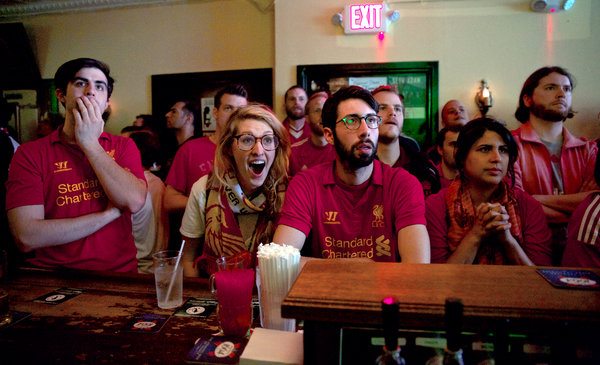Can English football learn a lesson from soccer?
Ahh, an article about the Americans’ attitude towards football – or ‘soccer’, as they drawl so impudently. A bunch of hysterical ignoramuses, yapping about a sport they know little about whilst munching hot dogs and fervently chanting their single ditty over and over again: “USA, USA, USA”.
The latter statement is true: they could do with a little more variety from their support. But having spent two weeks in Washington DC during the World Cup, I have to send a shiver down the spine of England fans by insisting that rather than scorning our long-standing allies on the topic of football, we could learn a lot from them.
“The goalie’s out of the net!” they screamed on repeat
At the beginning, I found it difficult to conceal a complacent mirth as they muttered about Cristiano Ronaldo’s threatening advances towards their ‘goal box’ during USA’s 2-2 draw against Portugal in the group stages. Even more amusing was their reaction to Manuel Neuer’s continued adventures outside his penalty area during Germany’s second-round victory over Algeria. “The goalie’s out of the net!” they screamed on repeat, as if the 28-year-old should stand transfixed while Per Mertesacker lumbered haplessly after the ball.
These things, though, are merely technicalities which we jeer at, forgetting that they simply reflect football’s subsidiary standing in the country. In terms of expectation and analysis, Americans are streets ahead of us.
Take their 1-0 defeat to the polished Germans in their final group game, which saw both teams advance to the round of 16 ahead of Portugal and Ghana. While the players celebrated, a faction of supporters were confused. How could a meek, passive performance lead to such delight, regardless of the ramifications? Quite right, for their inferiority suggested they would be in trouble after the group stage.

As knowledge of the beautiful game increases, soon American fans- like these guys- will be able to make a more informed decision as to who they support. Photo: NYTimes
After England’s 2-1 defeat to Italy – who, lest we forget, were beaten by Uruguay and Costa Rica in their other group games – the outpouring of positivity towards Roy Hodgson’s men was almost defeatist in itself, as if to suggest a gallant loss, specked with positive moments, represented an alternative triumph. Expectations were set too high in previous campaigns; they were set too low here in Brazil. Colombia proved that Uruguay were there for the taking, Uruguay proved that Italy can be nullified, while Costa Rica are no giants, for all their pluckiness. Yet so wary were we of inflating expectations that we accepted our exit feebly, cowed by our erstwhile hyperbole.
By contrast, the build-up to the second-round encounter with dark horses Belgium was peppered with thoughtful analyses in the American media. Marc Wilmots’ men possessed the personnel to win comfortably, but the belief and togetherness fostered by popular coach Jurgen Klinsmann meant they had an outside chance. And so it proved, as Kevin de Bruyne and Romelu Lukaku clinched Belgian glory in extra time after a virtuoso performance from Tim Howard in the American goal, his World Cup-record 16 saves a testament to his soloist defiance. The Americans recognised the necessity of Howard’s brilliance to keep them in the game, reflected on the strengths and weaknesses of a solid campaign, and vowed to look to the future. Pithy and uncomplicated analysis: no irrational discussion of Klinsmann’s future or pillorying of a single individual.
Dempsey is left to quietly lead his team to a position where they consistently meet expectations
The irony is that for all our derision towards Americans for their supposed ignorance on the subject of football, their very detachment is what enables steady progression. When they brandish their Clint Dempsey, we can trump them several times over for prestige and reputation. But we can push for Rooney to be eliminated from the starting line-up, and then call for him to be made captain after a commendable performance against Uruguay. From exclusion to leadership: from castigation to admiration. Meanwhile Dempsey is left to quietly lead his team to a position where they consistently meet expectations. Who would you rather be?
Were you to ask who loves the game of football more as a nation, England wins every time. After USA’s elimination, Americans largely switched off, for sport and patriotism are inextricably linked in soccer. But in terms of combining realistic expectations with unstinting support and measured analysis, it is no contest. This may hurt, British readers, but it is time to swallow your pride and accept that the Americans currently understand the state of their football a lot better than we do.

Comments